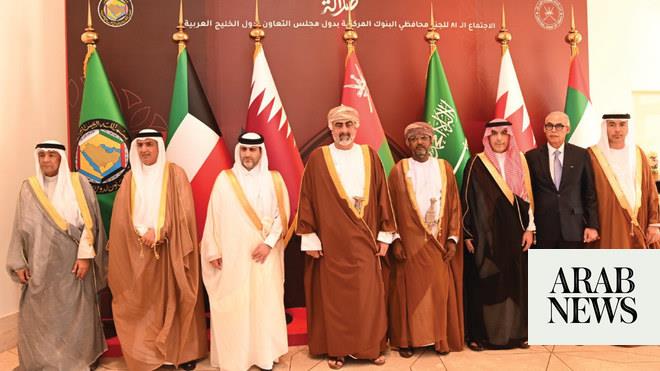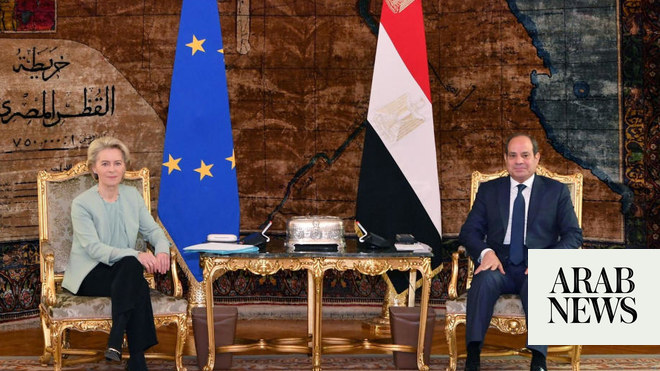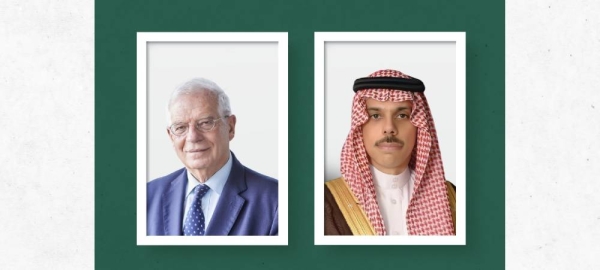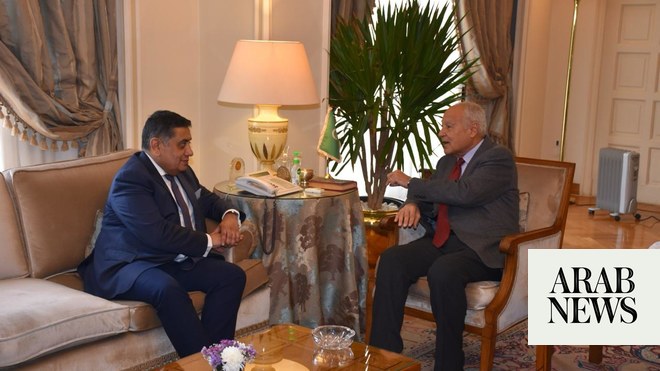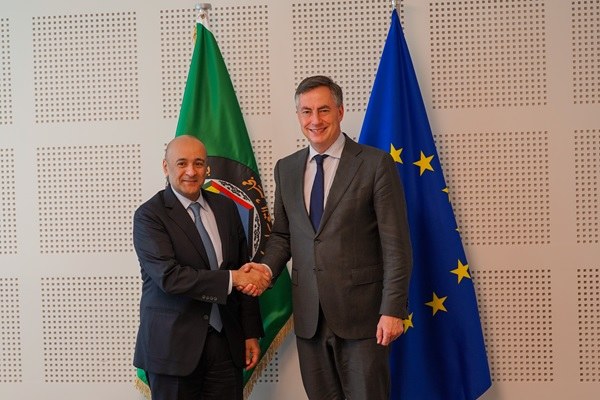
LONDON: The secretary-general of the Gulf Cooperation Council, Jasem Albudaiwi, held a series of meetings with EU officials in Belgium on Tuesday about ways to strengthen Gulf-European relations and cooperation in efforts to address regional issues.
During a session at the EU headquarters in Brussels with members of the EU Political and Security Committee, including its chairperson Delphine Pronk, Albudaiwi reviewed the strength and depth of the cooperation between the GCC and the EU at all levels.
“He stressed the great importance that the two sides attach to moving forward toward coordination in many security files, particularly ongoing commercial, economic and political relations,” the GCC said.
“These relations stem from a solid foundation represented by the alignment of views on various bilateral, regional and international issues.”
Albudaiwi also highlighted what he described as the continuous development of economic, trade and investment ties.
The discussions on Tuesday included “an extensive and in-depth exchange of views” on several regional and international issues, including the crisis in the Gaza Strip, officials said. On that issue the topics discussed included efforts to address the humanitarian crisis in the besieged territory, accelerate the delivery of aid, achieve a lasting ceasefire, and address crimes against Palestinians.
The pursuit of a just and comprehensive solution to the Palestinian cause was also discussed and Albudaiwi stressed the important need for the international community to implement laws and resolutions to help achieve a two-state solution.
On broader issues, Albudaiwi stressed to the Europeans the important need for them to consider granting citizens of GCC member countries an exemption from the Schengen visa scheme to make it easier for them to travel.
He welcomed the support he said has been shown by members of the committee for such an exemption, which he said reflected the status with which GCC countries are regarded in the EU, and the distinguished relationship between the blocs.
Such a move would reflect “the commitment expressed by the EU in its statement about its view of the best ways to develop the strategic partnership between the two sides, issued by the European Commission in May 2022,” he added.
“It is believed that this would represent an important step toward strengthening the strategic partnership between the two sides and clearly reflects the spirit of cooperation between the GCC countries and the EU.”
The issue of a possible visa exemption process for GCC citizens also featured in talks between Albudaiwi and Beate Gminder, the deputy director general of the European Commission’s Directorate for Migration and Home Affairs, along with a Gulf-EU mechanism for cooperation in the fields of migration and development.
“Gminder praised the efforts of the GCC countries toward strengthening cooperation with the EU in several fields, especially in combating terrorism, and the constant keenness of the GCC countries to communicate with the European side, and to hold joint workshops in this field to contribute to combating and eliminating terrorism,” the GCC said
During a meeting with David McAllister, chairperson of the European Parliament’s Foreign Affairs Committee, Albudaiwi “affirmed their mutual vision to build stronger relations at all levels between both sides, aiming to achieve the common goals of the strategic partnership between the GCC and the EU,” the GCC said.
The discussions between the two officials focused on the development of joint initiatives, enhancement of GCC-European parliamentary diplomatic relations, and exchanges of views on the latest regional and international developments, including efforts to achieve peace and stability.
Albudaiwi also held talks with Margaritis Schinas, the vice president of the European Commission responsible for promoting the European way of life, during which he stressed the need for unified efforts to enhance the principles of human life in light of global conflicts and crises that affect the lives of innocent people.
They also stressed the need to enhance coordination and consultation to help promote security and stability, enhance mutual trust, and strengthen cooperation in all matters of common interest.
In a message about her “constructive” meeting with Albudaiwi posted on social media platform X, Schinas wrote: “Focus on security, stability, common priorities as well as people-to-people contacts and mobility opportunities. Fostering a strategic engagement in difficult times.”
During a meeting with Hannah Neumann, the head of the EU’s Delegation for Relations with the Arab Peninsula, Albudaiwi said the GCC “is pleased with the level of its relations and coordination with all institutions affiliated with the EU, including the European Parliament” with the aim of bridging gaps in their perspectives on issues and achieving common goals.
In talks with Enrique Mora, deputy secretary-general of the European External Action Service, Albudaiwi emphasized the importance of joint action to address current challenges, and ways in which ties might be enhanced.
They reviewed several topics of mutual interest, including the grave consequences of the war on Gaza and its effect on regional and international security and stability, the GCC said.
Albudaiwi also met Boris Ruge, NATO’s assistant secretary-general for political affairs and security policy, to discuss the latest regional and international developments, including the war in Gaza and its implications for international peace and security.
They also talked about ways in which cooperation between the GCC and NATO might be enhanced, and the prospect of launching a process for ongoing dialogue between them the organizations.







